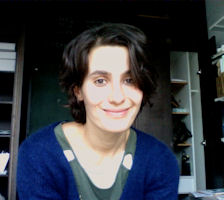 |
STAGES PER STUDENTI DI SCUOLA SECONDARIA STAGES INVERNALI 2009 |
 |
 |
LAURA FABIETTI
|
My name is Laura Fabbietti, I'm 34 years old and I'm Italian. I've been living in Munich, Bavaria, for 10 years and I'm junior professor at the Technical Universtity of Munich in the Physic Faculty. I lead a research group of 6 people and together with them we make a lot of experiments, mainly at the GSI facility, where it is possible to accelarate pion, proton and heavy ion beams and shoot them on fixed targets. Our research addresses the question: how do the "strange" quarks interact with the rest of the matter. Q: How and why did you decide to study physics and which is the best memory of your life as a student? I decided during the 4th year in the high school, during a lecture in the laboratory dealing with propagation of waves in water. I found so exciting to see how math can match reality and how physics can explain it, that I thought I would like to be a physicist. During the studies at the university, one of the most exciting moments was for sure the first time I have taken part into an experimental "night shift" of measurement at the laboratory in Catania (LNS). Q: Which difficulties did you have to face and what was the most exciting episode of your career? I had to work very much and learn to cope with a lot of technicalities and 'boring' details, which are not always directly connected to the physics you have in mind. The most exciting episode was last year, when together with my two students we tested for the first time the trigger system we have built in the last two years, doing more or less everything by ourselves. Q: What are you working at presently? I lead a group of 6 people at the university of Munich and we make experiments mainly focused in studying the interaction of kaon with single nucleons and nuclear matter. We make use of several experimental techniques, shooting beams of proton, pion or heavier ion on different targets. Q: Which do you believe will be the next discovery in physics? Dark matter evidence or Higgs boson. Q: In your opinion, which is the best discovery ever and who is your favorite scientist? Personally, the discovery I like the most is that proton and neutron are made up of quarks, via deep inelastic scattering and measurements of fmr factor. Q: How important is the collaboration in scientific research, especially among researchers from different countries? It is very important expecially for experimental physicists, since the machines and detectors are sophisticated and need a lot of man power for mantainance and development. On the other hand the degree of complexity of most of the physics items we are after also calls for an intensive collaboration among several scientists. It is of particular importance that theoreticians and experimentalists talk to each other.. Q: How can a scientist be defined and how do talent, intuition and study influence his profession? A scientist is a person who has learned the mathematical language to disentangle the natural effects and understand their evolution. Based on this knowledge, the scientist can develop a predictive power, to put forward hypothesis on the origin of many unknown phenomena. These hypothesis has to be confirmed by experimental evidence. Intuition and study are both two very important ingredients of the scientific recipe, whereas each scientist has his own personality and style in pursuing results. There are people who are very systematic and other whose ideas come in a more chaotic way. In both cases you have really to study a lot to be a good scientist! Q: What are your hobbies and passions and what book would you suggest us to read? I like to read literature very much and do sport. I like to cook and go out for drinks. Q: How do you see the future of research in this period of global economic crisis? Research is fundamental to guarantee progress also in the industry. Many of the scientific innovations are spin off results from research-work done at the university and at research centers. Moreover science exports competent and creative man power which is essential for the economic future of each country. |